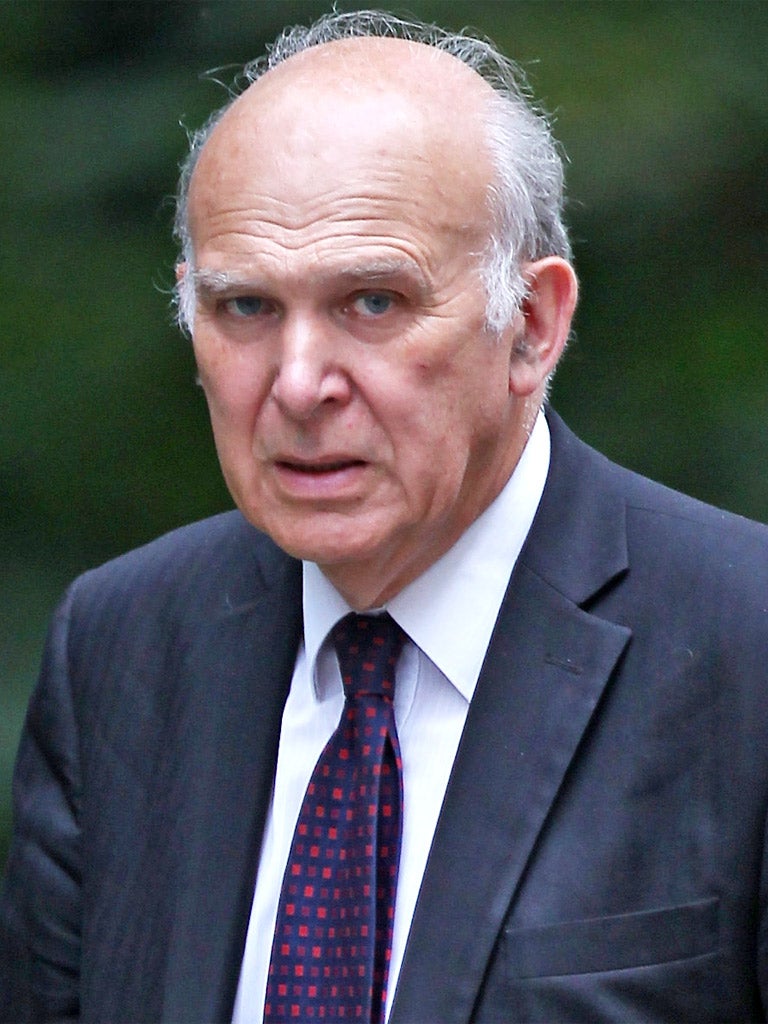Vince Cable finally cracks down on fat cats – but critics say they'll still get the cream
Pay deals to be made public and shareholders given new powers to veto lavish salaries

Your support helps us to tell the story
From reproductive rights to climate change to Big Tech, The Independent is on the ground when the story is developing. Whether it's investigating the financials of Elon Musk's pro-Trump PAC or producing our latest documentary, 'The A Word', which shines a light on the American women fighting for reproductive rights, we know how important it is to parse out the facts from the messaging.
At such a critical moment in US history, we need reporters on the ground. Your donation allows us to keep sending journalists to speak to both sides of the story.
The Independent is trusted by Americans across the entire political spectrum. And unlike many other quality news outlets, we choose not to lock Americans out of our reporting and analysis with paywalls. We believe quality journalism should be available to everyone, paid for by those who can afford it.
Your support makes all the difference.Big companies will be forced to face a legally binding vote every three years by shareholders on the salary packages given to senior executives under moves announced yesterday by Vince Cable, the Business Secretary. But he faced accusations of backtracking over previous promises to offer an annual vote and of not giving shareholders enough power to veto lavish pay deals.
The moves follow the so-called "shareholder spring" in which investors rebelled against the salaries of Sir Martin Sorrell of the advertising giant WPP, Sly Bailey of Trinity Mirror and Andrew Moss of Aviva.
From next year, such votes will become binding, with publicly listed companies required to obtain the approval of a majority of shareholders for executives' pay packages. They will have to stage them every three years – or every year when there are substantial changes to an executive's deal. Companies will be forced to disclose the total amount for an executive's pay, including salary, pension payments, share options and bonuses. They will also have to reveal the pay-offs given to departing directors and gain approval for them from shareholders.
Mr Cable told MPs: "For the first time there will be a real, lasting and binding control on pay. A company will only be able to make payments within the limits that have been approved by a majority of shareholders." Initially the Business Secretary floated the idea of annual pay votes, but decided to opt for votes to be staged every three years. He is said to have concluded that giving shareholders a say every 12 months on executive salaries would discourage long-term planning.
In angry exchanges, Chuka Umunna, the shadow Business Secretary, said: "It's deeply disappointing that having marched us all up the hill he appears to be marching us back down again by performing a U-turn on his original proposal."
He said: "Isn't it the case that this will simply incentivise boards to draft policy as broadly as possible so as to avoid anything other than a triennial vote?" Mr Umunna added that the Government should have been bolder and insisted that pay deals needed to be approved by 75 per cent of shareholders, rather than a simple majority.
Mr Cable retorted that Labour had done nothing in 13 years in office – a period in which the party had seven different Business Secretaries – to tackle boardroom excess.
Business groups welcomed the plans. John Cridland, director-general of the CBI, said: "This substantial package of measures strikes a balance, by giving shareholders increased transparency on pay and providing ways to hold boards to account."
Join our commenting forum
Join thought-provoking conversations, follow other Independent readers and see their replies
Comments